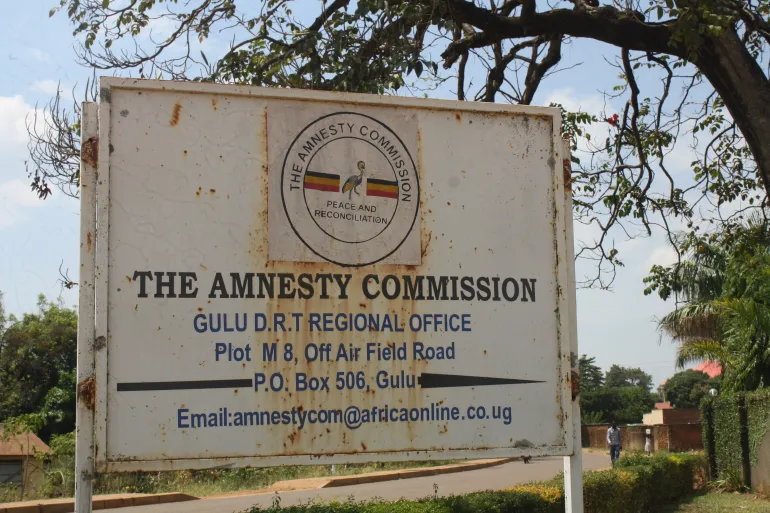Kwoyelo’s Fate:
In Gulu, northern Uganda, a market buzzes with activity, a stark contrast to the grim days when children sought refuge from the Lord’s Resistance Army (LRA). Led by Joseph Kony, the LRA dominated the region from 1987 to 2006, abducting children to serve as soldiers and sex slaves. Amid this backdrop, Thomas Kwoyelo, a former LRA commander, faces trial at Gulu’s High Court, marking the first instance of an LRA leader being tried in Uganda.
Kwoyelo was abducted as a teenager and served in the LRA for about 20 years, eventually becoming a senior commander. Captured in 2009, delays have marred his trial, and in April 2023, the prosecution concluded its case. While survivors of the conflict argue for Kwoyelo’s forgiveness and return, human rights organizations express concern over the prolonged detention hindering justice.
During the LRA’s reign, mass abductions prompted an amnesty policy in 2000, allowing fighters to return home without facing repercussions. Kwoyelo unsuccessfully sought amnesty after capture, leading to a protracted legal battle. Critics argue that Kwoyelo’s trial is unfair, citing others who have returned without trial.
Former LRA abductees have mixed opinions on Kwoyelo. Some view him as a supportive figure, nursing wounds and providing aid, while others recount his alleged cruelty, including accusations of killing as punishment. The controversial trial highlights tensions between justice, forgiveness, and the complexities of post-conflict reconciliation in Uganda.
The broader context involves the LRA’s rebel uprising, led by Kony, who aimed to overthrow President Yoweri Museveni and establish a regime based on the Ten Commandments. The conflict resulted in approximately 10,000 deaths, with civilians often targeted. The amnesty policy sought to reintegrate former fighters into society.
While some advocate for Kwoyelo’s forgiveness, others argue for accountability, emphasizing a nuanced approach to justice and reconciliation in the aftermath of the LRA’s brutal campaign.
The trial of Thomas Kwoyelo
A former commander of the Lord’s Resistance Army (LRA), occurs amid tensions over peace and accountability in Gulu, northern Uganda. Kwoyelo, abducted as a teenager and serving in the LRA for about 20 years, faces charges including rape, murder, and the forcible recruitment of child soldiers. Delays in the case, including court closures during COVID-19, have led to funding shortages, affecting the court’s ability to hold sessions consistently. The trial’s prolonged duration raises concerns about justice for both the accused and alleged victims.
The International Crimes Division of the High Court, where Kwoyelo is being tried, aims to act as an equivalent to the International Criminal Court (ICC), complementing national court systems. However, building the necessary capacity poses challenges, and victims, who have spent over a decade in limbo, express fatigue and anxiety. Human rights organizations, including Human Rights Watch, have urged Uganda to expedite the trial, emphasizing the impact of prolonged delays.
Simultaneously, the ICC has moved forward with a separate confirmation of charges against Joseph Kony, the leader of the LRA, in absentia in The Hague. The ICC’s actions aim to bring justice to victims who have waited for over 18 years for Kony’s prosecution. The United States has offered a five million dollar reward for information leading to Kony’s arrest, but past attempts to capture him have failed. The LRA, now weakened and divided, is estimated to number between 100 to 2,000 soldiers struggling to survive in jungles between the Democratic Republic of the Congo (DRC) and the Central African Republic (CAR).
In post-conflict northern Uganda, life continues, with former LRA members facing challenges of discrimination and stigma. Despite receiving amnesty, reintegrating into society is complex, and support groups aim to assist survivors of LRA captivity. Uganda’s parliament passed a transitional justice policy in 2019 to support war survivors, but its full implementation is pending. Efforts toward permanent peace and stability involve court processes, traditional methods, and ongoing dialogue about peace.
The situation reflects the complex aftermath of the LRA conflict, where justice, reconciliation, and rebuilding communities require multifaceted approaches.



